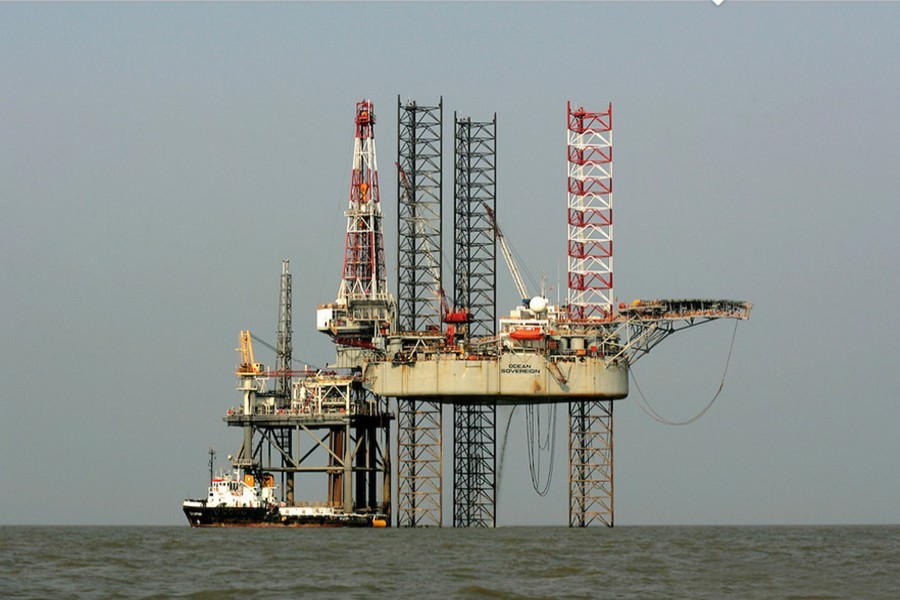
Published :
Updated :

The government's delay in launching fresh bidding for hydrocarbon exploration is pushing Bangladesh to rely heavily on energy imports, thus putting mounting pressure on economy, industry insiders said.
Petrobangla has recently finalised the latest model production-sharing contract (PSC) after three years' rigorous work since 2017.
The formula was aimed at launching the bidding round for oil and gas exploration at unexplored blocks.
But the state entity is still to invite bidders from interested international oil companies (IOCs) to explore the yet untapped hydrocarbon potential.
"We're awaiting a green light from Energy and Mineral Resources Division of the ministry to launch the bidding round," a senior Petrobangla official told the FE on Tuesday.
However, the local leading energy experts smell a rat over this protracted delay in inviting a fresh tender.
"I don't know why the government is not launching the much-needed bidding round," said Prof Mohammad Tamim, pro-vice chancellor at Brac University.
"Is it for a lack of business people's interests as there is no scope for short-term gains here?" enquired the former special assistant to a caretaker government's chief adviser.
Prof Badrul Imam of geology at Dhaka University assumed that a vested quarter might have been manoeuvering against fresh hydrocarbon exploration.
Bangladesh has huge prospects of having gas reserves in the unexplored areas, he observed.
Global energy think tanks like the US Geological Survey and the Norwegian petroleum unit have revealed that Bangladesh has around 30-trillion cubic feet undiscovered natural gas, said Mr Imam.
If this huge natural gas reserve is utilised, the country might not require importing expensive LNG (liquefied natural gas), he said, pointing to those involved in LNG businesses as plotters.
Currently, Bangladesh imports around 580 million cubic feet per day (mmcfd) equivalent of LNG at $8.0-$10 per mmBtu (million British thermal unit) to meet the mounting local demand.
The annual import of LPG (liquefied petroleum gas) has also reached an estimated 1.0 million tonnes at the retail price of around Tk 85 per kilogram.
Coal import in bulk has just started since this September for power generation.
The import of this fossil fuel will skyrocket with the initiation of power generation from coal-fired plants.
A 1320-megawatt coal-fired power plant will require importing annually around 4.0 million tonnes of coal, said a senior power division official.
Bangladesh has been importing coal at around $51 per tonne, he added.
Petroleum product import is currently hovering around 6.50 million tonnes annually.
"Overall economy will be at great risk if Bangladesh continues to rely on energy imports without exploring local potential," said Centre for Policy Dialogue additional research director Khondaker Golam Moazzam.
Petrobangla floated the bidding round six years back in 2012 through which shallow-water blocks and one deep-water block was awarded to contractors.
But not a single exploratory well was drilled by the contractors by this time.
Petrobangla rather extended the tenure of PSCs for each of the contractors by two years each.
The country's natural gas output is hovering around 3,140 mmcfd, some 557 mmcfd of it is regasified LNG.
The entire local production comes from onshore gas fields.
For offshore exploration, five IOCs have active PSCs either individually or under a joint venture to explore three shallow-water blocks and one deep-water block.
ONGC Videsh Ltd (OVL) and Oil India Ltd (OIL) are jointly exploring shallow-water blocks SS-04 and SS-09.
The Australian Santos and Kris Energy joint venture is exploring shallow-water block SS-11.
POSCO Daewoo Corporation has an exploration contract to discover hydrocarbon in deep-water block DS-12.
The country has not offered any onshore oil and gas blocks since 1997.
azizjst@yahoo.com


 For all latest news, follow The Financial Express Google News channel.
For all latest news, follow The Financial Express Google News channel.